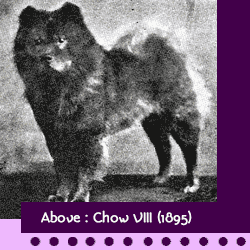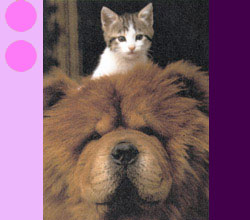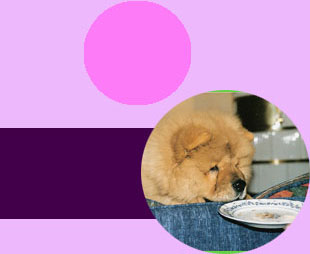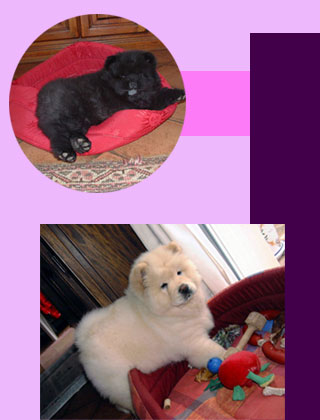change coat. Care should be taken not to drag the soft undercoat out. Tangles should be teased out and special attention paid to the thick hair on the back of the legs and the hindquarters and the soft fine hair behind the ears.
Bathing - puppies can be bathed from 8 weeks onwards in a mild dog shampoo making sure to rinse thoroughly and being careful not to get soap in their eyes or water in their ears.
HEALTH
For your own peace of mind it is advisable to take your puppy to a vet close to your home as early as possible for a check-over and any inoculations/worming that may be due as advised by the breeder.
Inoculations : Most vets start inoculations at 8 weeks with a follow-up at 10 weeks and then once a year after that. Do not take puppy out in public until your vet advises his inoculation programme is complete.
Worming : Puppies should be wormed for roundworms every two weeks until twelve weeks old or free of worms then wormed monthly until six months of age. It is recommended that adult dogs should be wormed at least twice a year and preferably four times if you have children or you live where there are farm animals. Your breeder will tell you when puppy was last wormed and what with and your vet will advise what further worming is necessary It is important never to worm and treat for insects within 3 days of each other.
There is no breed without health problems. Generally Chows are healthy and stoic and live 12/14 years. The following are the exception rather than the rule as all reputable breeders aim to eradicate poor health issues. However your Chow may encounter the following :
Entropion : (eyelids that turn in) can require an operation to remove the offending excess skin but providing no damage is being caused to the actual eye your vet may wish to wait until the head has fully developed before operating as the condition can correct itself, when the Chow's head grows. However Chows often have wet eyes, if teething as pups, or when stressed, or in windy conditions, or occasionally when the tear ducts are blocked.
Eczema/hot spots : Chows are inclined to get this particularly in warm weather and may chew their coats. If this occurs and they cause a sore area it is essential to clean this and let the air get to it so that it will heal. If the coat pulling and itching persists and no parasites are present (fleas are very rare on Chows), a change of diet to less meat or a lower protein food may solve the problem.
Bloat : In common with any deep chested breed the adult Chow is prone to bloat (excess air in the stomach), which can cause the stomach to swell rapidly and twist painfully and can be fatal if veterinary attention is not sought immediately. It can be caused by food swelling in the stomach therefore an adult Chow should be fed two smaller meals rather than one large meal and any biscuit mix should be thoroughly soaked.
Cruciate ligament : As most breeds, jumping or turning quickly can damage the ligaments in the knee.
Breathing Some Chows (usually the heavier headed ones) suffer from breathing problems, particularly in warm weather, and if your Chow appears to struggle for air it might be wise to consult your vet. This should not be confused with the grunting noises a Chow makes when it is talking to you.
Hip Dysplasia : This can affect all breeds and occurs where the ball joint doesn't fit snugly into the socket. This hereditary condition can lie dormant for several generations but high- scoring parents increase the likelihood of high-scoring progeny so check that the parents have low scores.
Heatstroke : Again this affects all breeds but particularly heavy-coated ones like the Chow. Never leave a Chow in a car on a hot day - even if the windows are left open and the car is parked in the shade the Chow's heavy coat can result in him overheating and dying. Sometimes an otherwise perfectly healthy dog may get overheated in hot weather or due to stress. This can cause heat stroke and immediate action is needed to cool the Chow down. The easiest method is to stand or sit the Chow in a quantity of cold (not icy) water with a cold, wet towel on his head, until its body temperature drops. Also seek urgent veterinary attention.
Your veterinary surgeon is there to help if you think that your Chow has any serious problems, but careful checking of the dog regularly will often prevent costly visits to the vet as so many things can be prevented before they become serious.
INSURANCE
Pet insurance is recommended but shop around as policies vary - some have high excesses, exclude preventative treatments such as worming, vaccination, neutering, pregnancy related, have limits per ailment or limits per year and do not cover dogs over 7 years of age.
|






